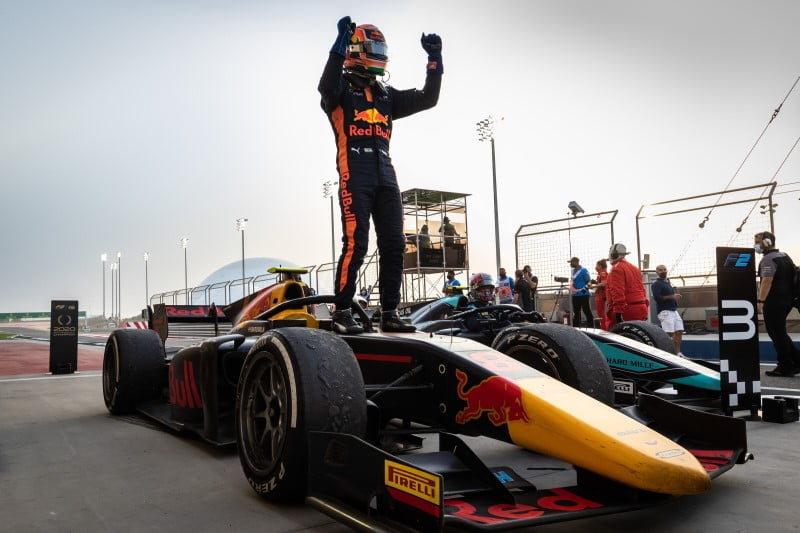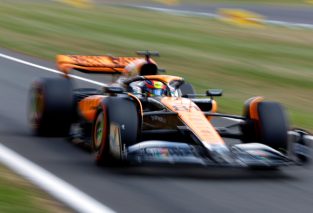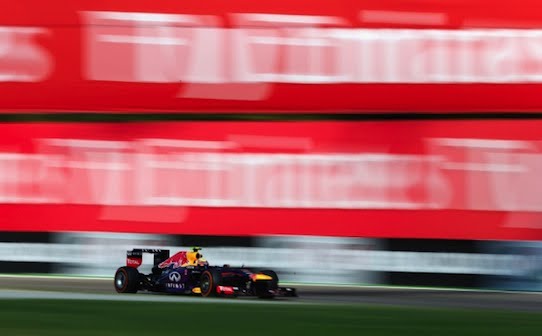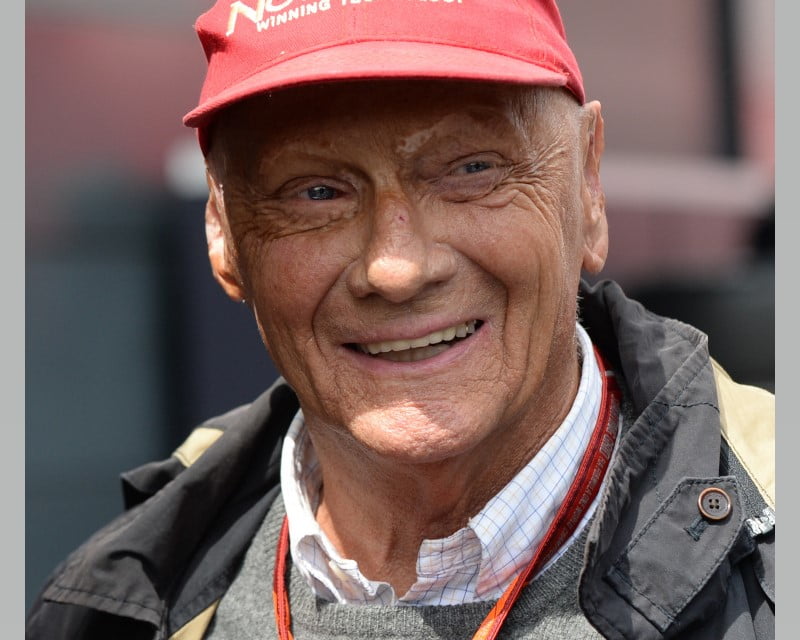In this exclusive interview, Jehan Daruvala digs deeper into his F2 season, discusses the new series format and the infamous radio message exchanged with his race engineer in the race at Silverstone.
Jehan Daruvala made history last month by becoming the first Indian to win a Formula 2 race. But Jehan’s maiden season in Formula 2 should be remembered for much more than his victory in the sprint race in Bahrain. It was a season in which he worked on his early struggles to convert them into late-season successes. It was also his first season as a Red Bull Junior Driver.
So what were his engine troubles, how did he work on his race starts and how straightforward were his interactions with the Head of Red Bull’s Driver Development Program, Dr Helmut Marko? In this exclusive interview for Firstpost, Jehan and I dig deeper into his season. We also discuss the new Formula 2 format that will come into effect into 2021 and the infamous radio message exchanged with his race engineer in the race at Silverstone.
This interview has inputs from Dr Marko himself. The Austrian rates Jehan’s performance through the season and explains what the young Indian needs to do to be considered for a drive in Formula 1 in the future.
OMG! What have you done!! @DaruvalaJehan WINS his first-ever @FIA_F2 race. WOOHOO!!! He becomes the FIRST INDIAN to win in the new #F2 championship. WHAT A MOMENT for Indian Motorsport. #SakhirGP #RedBullRacing #F1 #RoadToF1
— Kunal Shah (@kunalashah) December 6, 2020
Jehan remains India’s best Formula 1 hope. Understandably, the primary interest regarding his career is around when he will race in Formula 1 — his chances being seemingly brighter since his joining of the Red Bull Junior Program earlier this year. Narain Karthikeyan, the last Indian driver to race in Formula 1, did so back in 2012. In the pipeline, there seems no other Indian poised to race in Formula 1 for at least another three-five years. Hence for the 31 million fans of the sport (source: Formula 1) in India, Jehan is a ray of hope and his recent victory would have only fueled that further.
Before addressing specific questions about his season, Jehan said of his plans for 2021, “I’m definitely going to drive in Formula 2 and that too with a top team. I can’t comment too much on what team and whether I will be in or out of the Red Bull Junior Program. But I can say that things are looking good for next year and I will be in a team that will be competitive enough to fight for the championship.”
‘Progressive’
“Progressive, that’s the right word for my season. It was almost like an upward graph of progression that finished at its peak,” said Jehan when asked to summarise his maiden Formula 2 season in one word. His comments were echoed by Dr Marko, “Jehan showed good development during the season. The highlight was a win in the last race. His progress was seen in his racing in general and his start performance.”
Helmed by Dr Marko, the fast-paced Red Bull Junior Driver program is known for its knack to support and reward talented racing car drivers. But how was it to deal with the ever-honest Dr Marko? And was Jehan a recipient of one his famous early morning calls? “I’ve not received calls at early hours. He’s been very nice with me. He’s seen my data and understood where I’ve been coming from and sort of held on and stuck with me. He’s always on top of things! At the start of the season, he wasn’t happy at all with how things were going. But towards the end of the season, I would say he’s been pretty happy with me and that’s what came out in the talks and meetings we’ve had.
“He’s also fairly straightforward, which I like. He knows a lot more than we think he even watches. He tells when you’ve done badly, where you can improve and also when you do well. There is direct touch with Dr Marko. But because of the pandemic, it was more on the phone but not too much personal interaction. The only time I met him was after my win (Sakhir) when he fist-bumped me after the podium,” said Jehan.
Valtteri Bottas Interview: There’s Always A Threat To My Seat In Mercedes (ref: George Russell)
Biggest Moment of the Season
“The biggest moment that changed the course of my season was changing my engine — this was from the sprint race in Monza. I was complaining a lot about the lack of power. I had the data of my teammate and in Sector 1 in Spa, which is basically just one corner since Eau Rouge is flat, I was four-and-half-tenths off. In the last sector, which is again just one corner, I was three-tenths off. In the middle sector, I was actually faster than him. We saw on the data, I was six-tenths off pole and was pretty much losing time on the straights.
“I was pretty angry at the time. In Monza, my deficit became even more clear. I did my qualifying super close to the car ahead and I was still four-tenths off on the straights and I was only three-tenths off pole. Those two weeks were fairly frustrating. But Dr Marko and Trevor (Carlin) knew what was going on. Finally, I had a new engine from the sprint race in Monza. I qualified sixth in Mugello and on the front row in Sochi. I was in the fight for pole in both the races in Bahrain. Such small things make a big difference in Formula 2. In a race, instead of being a car being always attacked you can be the one attacking. You can save tyres a bit more — it changes the course of the race and the season overall,” explained Jehan.
What Exactly Was The Issue With Jehan’s Race Starts?
Jehan’s Formula 2 season has been that of two halves — before and after his engine change in Monza. Prior to his engine change, Jehan had scored only 19 points — his highest finish being fourth in the sprint race at Silverstone. After his engine change, Jehan amassed 53 points — a tally that put him in the league of top six scorers in the championship. But engine woes aside, Jehan had another issue to contend with — bad race starts. Was it a dodgy clutch or was it him requiring time to adjust to the start procedures in a Formula 2 car?
“I had a dodgy clutch once or twice. These cars are very difficult to get off the line. The throttle needed to get off the line is actually very minimal. Last year in Formula 3, it would just be full throttle, find the bite point, drop the clutch and off you go. But in Formula 2, we now play with how much throttle is required, clutch maps and so on. So it took a long time — a lot longer than I would have wanted.
“But we were going for a procedure which was good, but if it went bad, you would lose a lot of places. I spent two months with the team to get a start procedure which would help get starts good enough to get off the line and not lose positions or stay in my position. This worked well for me and I got consistent towards the end — and then I had normal starts and if someone had bad starts, I was the one overtaking them,” confessed Jehan.
But the going was tough in the initial days of the championship.
“I kept wondering how could I be so bad at getting off my line. Every time I qualified in the top six, I used to go to bed hoping to get off the line cleanly the next morning. That wasn’t the right frame of mind to be in. And then naturally, everyone would be on my case — so the start was my main worry at the time. Because if I qualified sixth, I would probably be 10th by Turn 1,” said Jehan.
Lando Norris Interview: If’s A Tree, I’m Most Likely To Hit It (Ref: Rallying)
How Jehan Worked On His Race Starts
Apart from the cars and competition, that a Formula 2 weekend has just one practice session adds to the challenge for a driver.
So how did Jehan work on his starts?
“You just have to study data because you can do just one start a weekend in the practice session. It’s about studying with the team and attempting what we think is right. We worked hard on the starts for two weeks in the factory and already in Mugello I found a good procedure and we built further on that. From being the worst starter on the grid in the first half, I was probably the second-best starter in the second-half of the season. From Mugello onwards, I had very good starts and things just got better from there on,” explained Jehan.
Digging deeper into his improved start performance, Jehan said, “We basically analyse how many positions are gained off the line before turn 1. The other metric is how long it takes to go from 0 to 100kmph. In the second part of my season, I was eight-tenths quicker than in the first half (going from 0-100kmph) — so that’s almost a second quicker just in the race starts over the course of the season.”
Radio Ga Ga
His early season struggles were amplified further after an embarrassing radio message from his engineer in the race at Silverstone. ‘Just ***ing drive fast’, screamed his engineer on the radio. Explaining more regarding the radio message, Jehan said, “To be honest, I was fine. I know my engineer well. If I make a couple of mistakes, he can get a bit emotional. He’s in the fight with me, which I quite like. We laughed about it post-race. I knew it would be broadcast, so I held my tongue and continued racing.”
“Yes, these things happen. For example, in the last race that I won, my driver coach could see me brake onto the kerb into Turn 1. So my engineer came on the radio and said ‘Peter is going to have a heart attack if you keep driving on the kerb into Turn 1’ and this was actually broadcast on the feed. It’s quite casual and calm when we are in the car. But the funnier thing is that I copied and did the same thing on the next lap!”
“Sometimes we can’t spot things on track that our team and engineer can. In your cockpit, you’re basically limited to what you have. You have to trust your team in terms of strategy calls — as a driver sometimes you do feel you’re going to be right. But you may not know if there’s a VSC or SC or yellow flag somewhere. So it’s good to trust and rely on the team. If they say ‘box, box, box’, you have to box, whether you like it or not. It’s good to form that bond and trust in the team,” said Jehan of his year with Carlin, a team he and his team-mate Yuki Tsunoda helped finish third in the Teams’ Championship.
A fantastic end to a fantastic season… ??
Thanks for joining us ! ?#F2 ?? #SakhirGP pic.twitter.com/M4grVkpD1W
— Formula 2 (@FIA_F2) December 7, 2020
How Was It To Experience A Competitive Pit-Stop?
The 2020 Formula 2 season was also Jehan’s experience in making a pit-stop under race conditions. While discussing his experience, Jehan said, “The hardest thing is actually when we do pit-stop practice. They push you at really slow speeds and to judge it then it tougher. It’s more natural when you come into the pit-lane speed limit. Thankfully, I’ve not struggled with pit-stops through the season.
“We have a good team who analyse our pit-entry, how we stop in the box, how soon we release the clutch and then getting off the pit-limiter. As a rookie, it takes a couple of rounds to get into rhythm. But you can’t really take your pit-stops lightly because the reason you box early is to undercut or overcut, so you need to make sure that your pit-stop is as fast as possible — so even five or six-tenths could mean you could come out behind a car and lose time in seconds in terms of race time. So the objective was to always nail my pit-stops.”
In What Year Will Max Verstappen Win His Maiden F1 Title?
On The New Formula 2 Format
The Formula 2 organisers have announced a new championship format from the 2021 season. From the current two races per weekend, the new format would see an extra race being added to the schedule. This would mean more championship points on offer but Jehan was cautious in his judgment.
He said, “I would actually prefer to have the normal (current) format because I believe in my one-lap pace and the ability to qualify at the sharp end of the grid. It’s kind of baffling for me because the goal for the first race is to start 10th. The whole reason you qualify on the front row is to stay out of trouble.”
“But now (the new format), they put you bang in the middle of where the trouble could be — 10th is the centre of where the mess could be. The only problem is that if you qualify first, start 10th and then someone takes you out in Turn 1 you almost don’t score for two races. So you are almost being penalised for starting on pole! It will make things more exciting and bunch up the grid further. Even more so for next season, starts will be important. Obviously at tracks like Monaco, starting 10th isn’t ideal. The format doesn’t make too much sense because you could be better off finishing 10th in one race and start on pole for the next race and win rather than finish fifth twice! It doesn’t make much sense to me but it is what it is.”
The Reality of A Motorsport Career
Finally, we get to the business end of our conversation. A good performance in Formula 2 notwithstanding, there are no guarantees of a chance in Formula 1. In fact, Callum Illot (vice-champion, 2020) and Nyck de Vries (champion, 2019) have both expressed the lack of opportunities to progress to the top step of the Motorsport ladder. How does Jehan deal with such realities of a Motorsport career?
Jehan explained, “It is sad that drivers like Callum and Nyck didn’t get their promotion to Formula 1. But it’s not all over for them. Maybe Nyck is on a different path now (he races for Mercedes in Formula E) but he and Callum could still have a seat in Formula 1 in the future. In my opinion, if you are in the top five in Formula 2, it’s all very close and you’re as good as each other till a certain point. If a driver can bring money that can develop the car further and make the car go half a second faster there’s no point in having a driver who can go a few tenths faster.”
Jehan’s team-mate Yuki Tsunoda was recently announced as the second driver for Alpha Tauri in 2021. Dr Marko explicitly said, “Jehan has to improve his race craft and must be regularly in the top 5 (in 2021) to be eligible to test a Formula 1 car.” Dr Marko went a step further to explain why a driver much-lower in the championship than Jehan (Marino Sato) tested for Alpha Tauri at the recent young drivers’ test. “Sato was a commercial deal. Only Tsunoda was fixed for the young drivers’ test,” confessed Dr Marko.
“It’s quite hard to explain, but from my side Red Bull have been very good in promoting drivers without much backing or sponsorship. They see if you are good enough and they promote you to Formula 1. I’m confident that if I deliver in 2021 I should have a good shout for a seat in Formula 1 in 2022,” said Jehan.
This post was first published on Firstpost.














